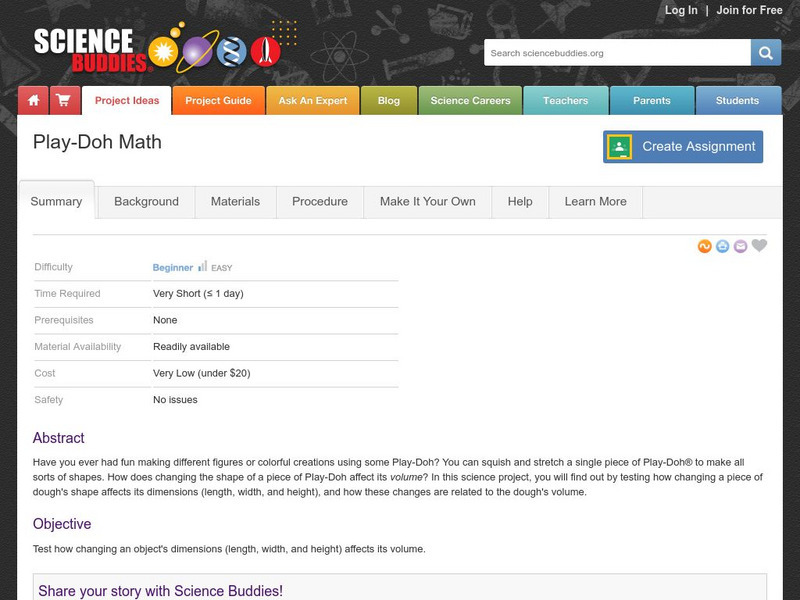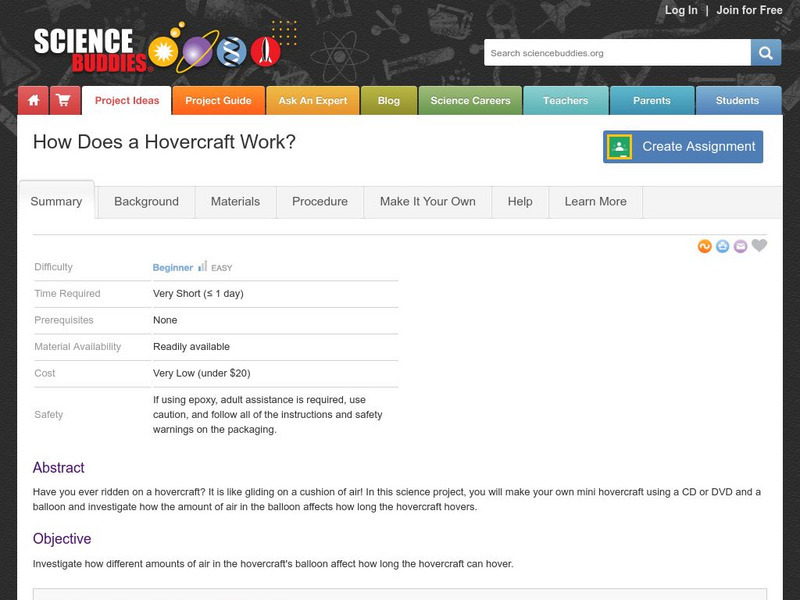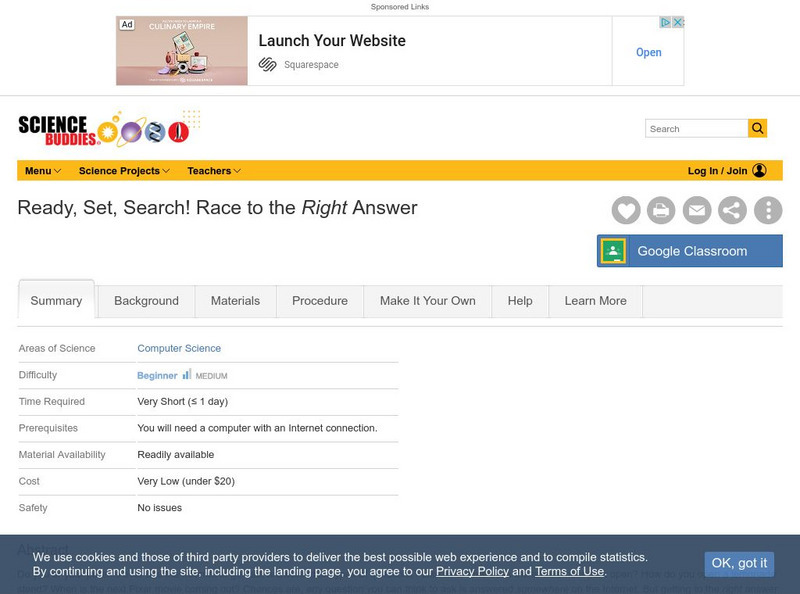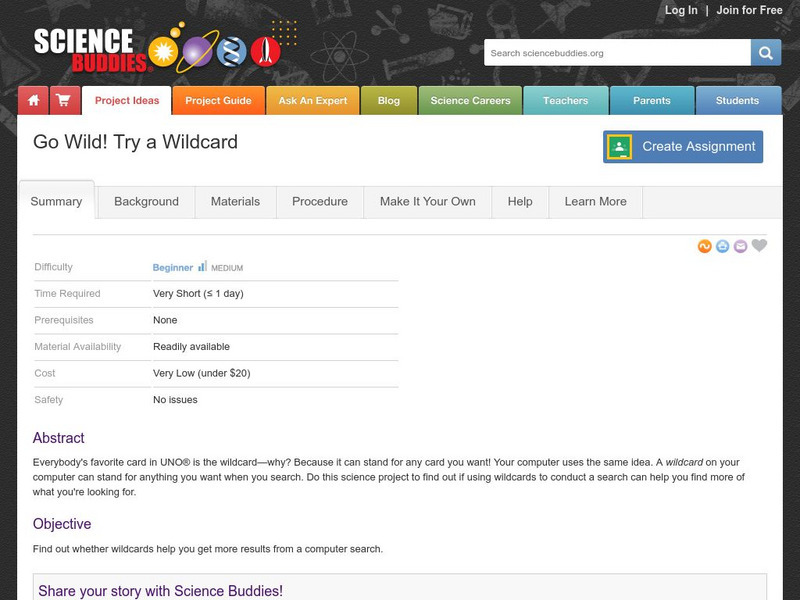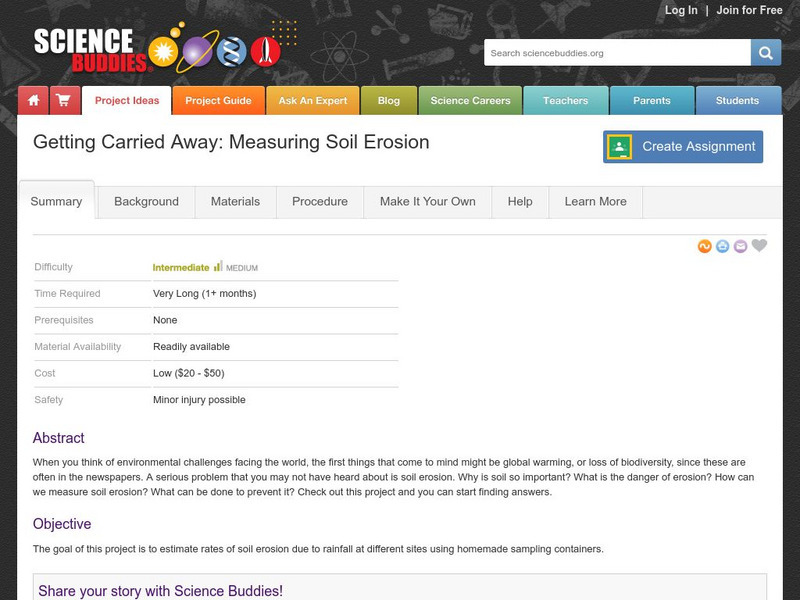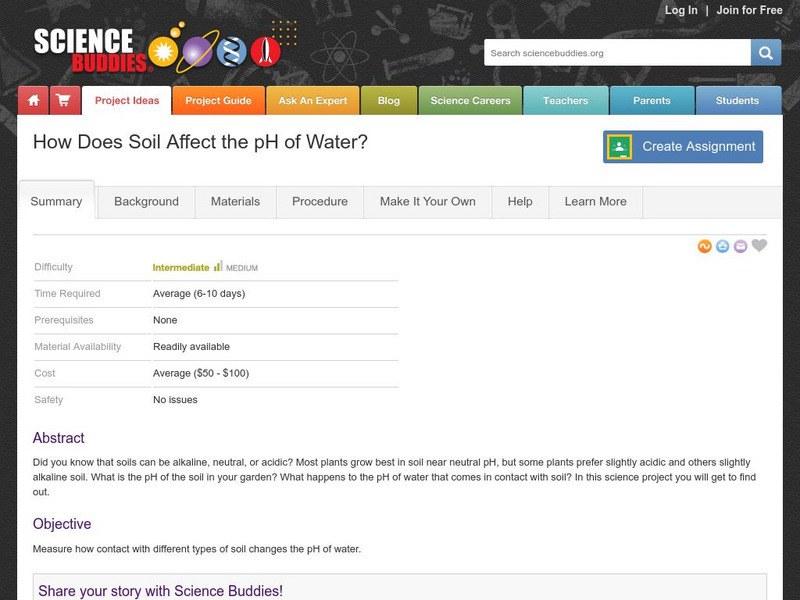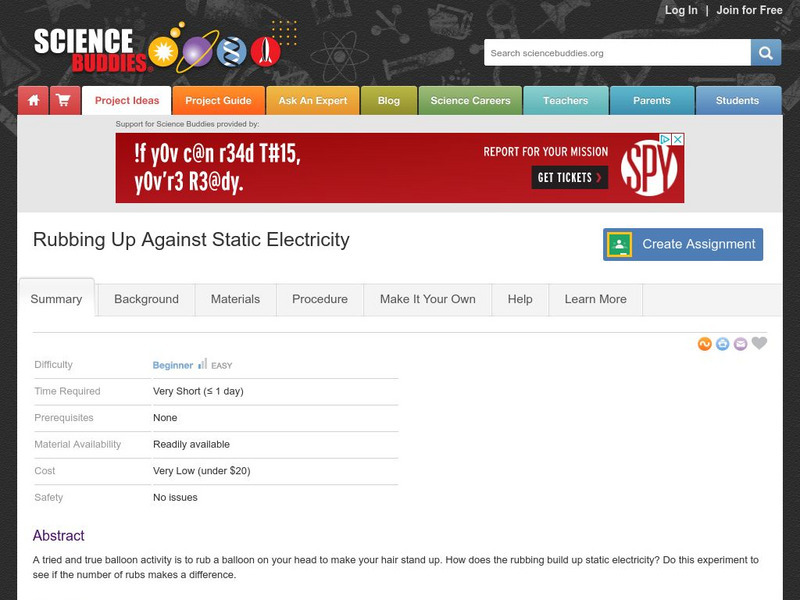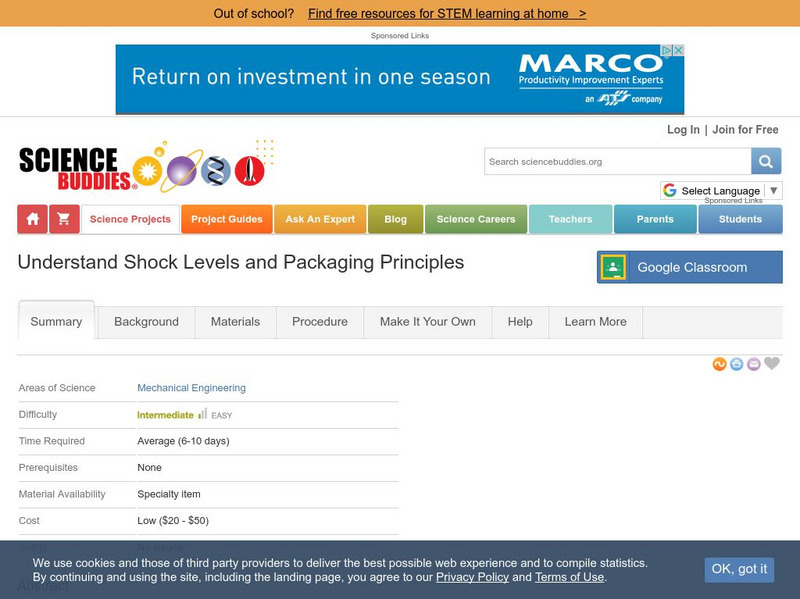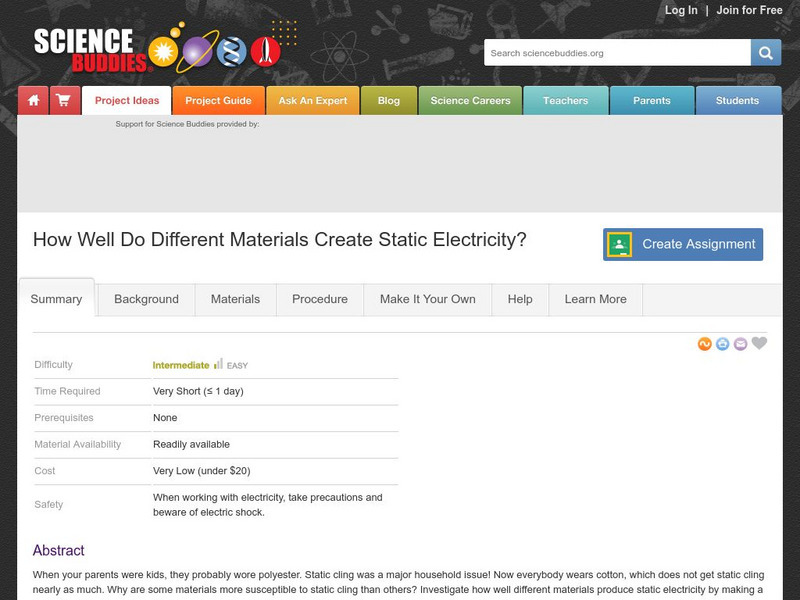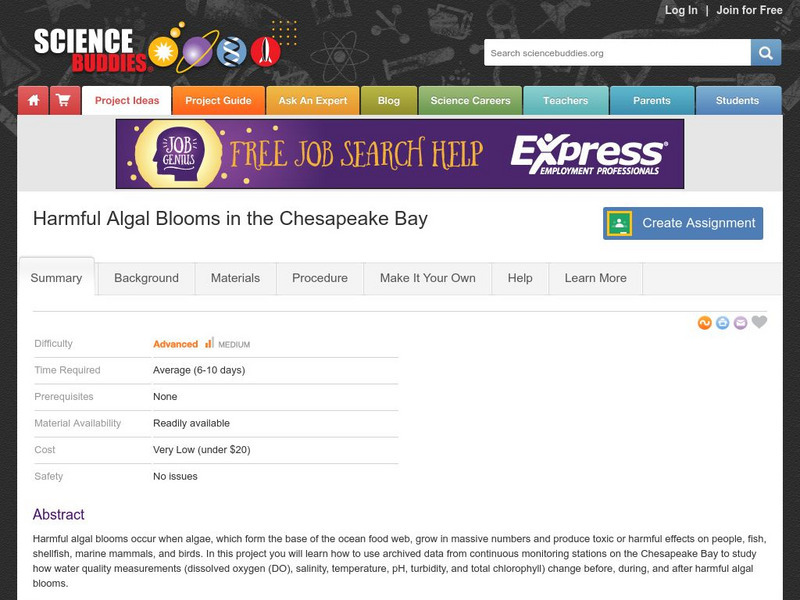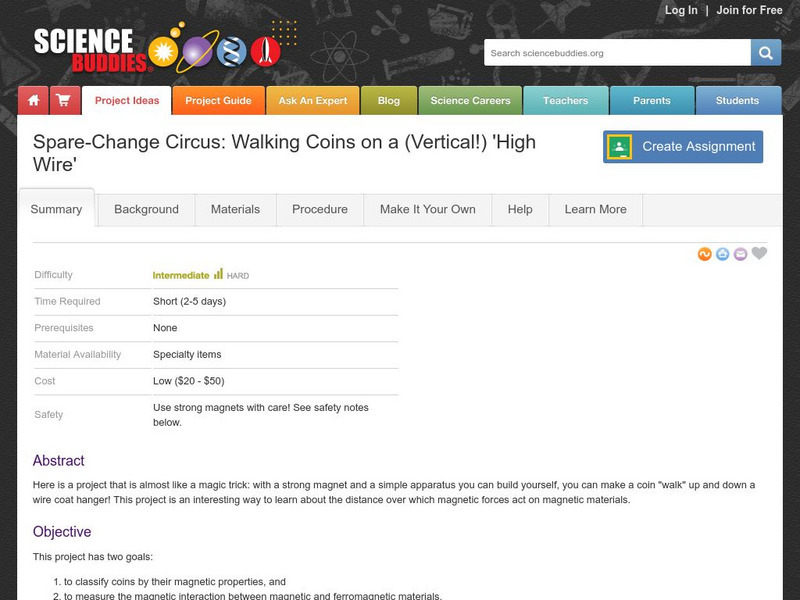Science Buddies
Science Buddies: The Big Dig
Even though many cities have recycling programs, a lot of trash still ends up in the dump. Find out which materials will break down and which materials won't. Will the results of this experiment change which products you often buy?
Science Buddies
Science Buddies: Dry Spells, Wet Spells: How Common Are They?
Here's a project that looks at what the weather was like for over a hundred years. The goal of the project is to compare long-term precipitation patterns in different regions of the country. You will work with historical climate data,...
Science Buddies
Science Buddies: Get Down and Dirty: How Does Soil Change With Depth?
What covers less than 10% of the Earth's surface, yet is a vital natural resource for terrestrial life? What filters ground water and supports most of our food production, not to mention the production of building materials and paper?...
Science Buddies
Science Buddies: Play Doh Math
One piece of Play-Doh can make many different shapes. Even though you can change the shape by squishing or stretching the Play-Doh, it is still the same size unless you add or take away some of the dough. Try this experiment to test how...
Science Buddies
Science Buddies: Juice Box Geometry
Juice boxes are so convenient, just poke the straw in and sip away. It might surprise you how much thought goes into the design and manufacturing of a juice box. Each manufacturer has carefully calculated how big each side should be to...
Science Buddies
Science Buddies: M&m Math
By using a simple bag of M&Ms, you can conduct an experiment in statistics to determine the frequency of colors in the package. The Science Buddies project ideas are set up consistently beginning with an abstract, objective, and...
Science Buddies
Science Buddies: M&m Geometry
Geometry is the study of how to use math to describe and investigate different points, lines and shapes. The way that a shape is described in geometry is with a formula, which is simply a mathematical way to calculate different...
Science Buddies
Science Buddies: How Does a Hovercraft Work?
Riding on a hovercraft is like gliding on a cushion of air. Make your own mini hovercraft in this experiment to test how hovercrafts work.
Science Buddies
Science Buddies: Font and File Size
What is your favorite font? In this experiment, you will test how the font style of the letters (or characters) in a file might change the size of the file.
Science Buddies
Science Buddies: How Many Letters?
Can you remember all of your ABC's? Computers need to "remember" letters too. Every time we use a computer to write a story, the computer needs to "remember" the letters in the story by saving them to the computer's memory as a file. In...
Science Buddies
Science Buddies: Getting More Out of Less : Google Hits and Search Terms
Google is the name of the most often used search engine on the Internet. "Googol" is the mathematical term for a 1 followed by 100 zeros. It's a very large number. This experiment will help you test different search terms and find out.
Science Buddies
Science Buddies: Wild About Wildcards
The idea of a wildcard allows you to satisfy any condition. The same concept is behind using a wildcard when searching for something with your computer. Do this experiment to find out if using wildcards to conduct a search can help you...
Science Buddies
Science Buddies: Getting Carried Away: Measuring Soil Erosion
When you think of environmental challenges facing the world, the first things that come to mind might be global warming, or loss of biodiversity, since these are often in the newspapers. A serious problem that you may not have heard...
Science Buddies
Science Buddies: How Does Soil Affect the P H of Water?
Did you know that soils can be alkaline, neutral, or acidic? Most plants grow best in soil near neutral pH, but some plants prefer slightly acidic and others slightly alkaline soil. What is the pH of the soil in your garden? What happens...
Science Buddies
Science Buddies: Rubbing Up Against Static Electricity
A tried and true balloon activity is to rub a balloon on your head to make your hair stand up. Learn how the rubbing builds up static electricity using this experiment to see if the number of rubs makes a difference.
Science Buddies
Science Buddies: Understand Shock Levels and Packaging Principles
When you open up your presents on your birthday, you probably don't spend a lot of time admiring the wrapping-you'd much rather see what's inside. It can be the same way with the packaging that products come in, but packaging is...
Science Buddies
Science Buddies: Photography With Near Infrared Illumination
Have you ever wondered what it would be like to have an extra sense? What if you could hear above the normal range (ultrasound) like dogs or bats? This project shows you how you can use a camera, tripod and a special filter to take...
Science Buddies
Science Buddies: Digital Pinhole Camera
If you sit under a leafy tree on a sunny day, you may notice spots of sunlight on the ground from light passing through spaces between the leaves. Try putting a piece of cardboard on the ground and examining the spots of light on the...
Science Buddies
Science Buddies: Cd Burning: Take It to the Edge
Did you know that you can tell how much information is on a CD-R without even using a computer? Find out how in this "reflective" experiment.
Science Buddies
Science Buddies: How Do Different Materials React to Static Electricity?
Polyester clothing was generally accepted as a popular trend in fashion at one point in history. Now everybody wears cotton, which doesn't get static cling nearly as much. Why are some materials more susceptible to static cling than...
Science Buddies
Science Buddies: Digital Photo Contrast
What do you do if you take a photo and it turns out too dark or too bright? You can use your computer to fix it for you. In this experiment you will investigate how changing the contrast of a digital photo will change the colors and...
Science Buddies
Science Buddies: Rock On! Recording Digital Data With Magnets
This is a straightforward project that shows you how data can be digitized and stored on magnetic recording media. You'll learn how alpha-numeric characters are digitized, and you'll use bar magnets to represent the individual data...
Science Buddies
Science Buddies: Harmful Algal Blooms in the Chesapeake Bay
Harmful algal blooms occur when algae, which form the base of the ocean food web, grow in massive numbers and produce toxic or harmful effects on people, fish, shellfish, marine mammals, and birds. In this project you will learn how to...
Science Buddies
Science Buddies: Walking Coins on a (Vertical!) 'High Wire'
Here is a project that is almost like a magic trick: with a strong magnet and a simple apparatus you can build yourself, you can make a coin "walk" up and down a wire coat hanger. This project is an interesting way to learn about the...



